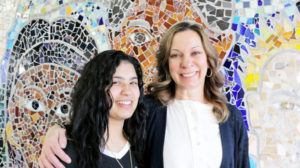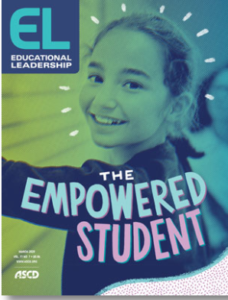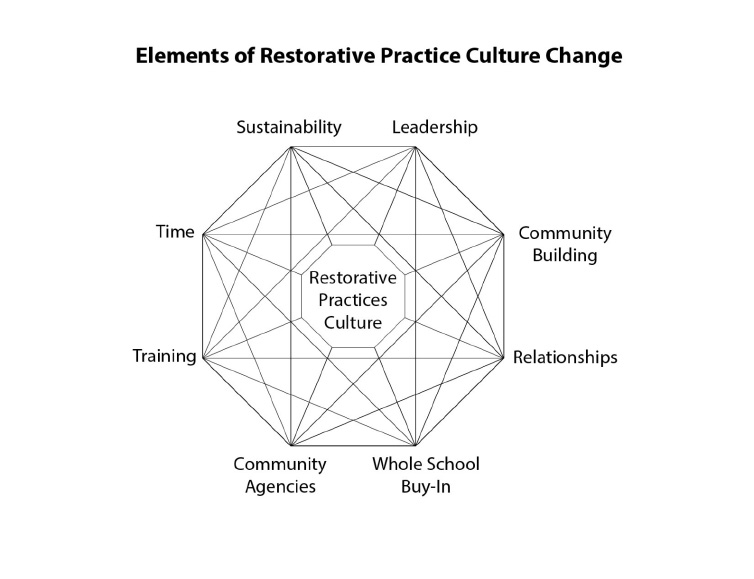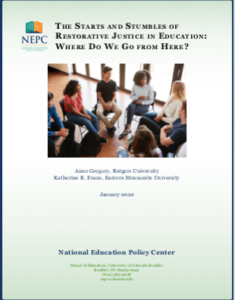
Restorative Practices
Restorative practices, an alternative discipline approach focused on repair rather than punishment, has attracted the attention of school districts throughout the United States. As mounting evidence demonstrates the long-standing system of punitive discipline to be not only ineffective in reducing behavioral incidents but to be detrimental to young people, particularly those of color, districts are increasingly turning to the research-supported practice of restorative justice. Despite challenges in teacher and staff buy-in, capacity building, and reshaping culture to accommodate a shift to restorative practices, schools adopting this approach have already demonstrated positive results.
In the News
East High: Embracing a restorative approach, rochester.edu (Summer, 2019). This piece highlights the experiences of an East High social worker and student who describe the way restorative practices have created safe spaces and built community for students at East.
A mixed picture on suspensions, Rochester Beacon (January 3, 2019) . This article, about the overuse of school suspensions in Rochester City Schools also reports on how restorative practices at East has helped sharply reduce suspensions.
. This article, about the overuse of school suspensions in Rochester City Schools also reports on how restorative practices at East has helped sharply reduce suspensions.
East students find that friendship is round, City Newspaper (November 15, 2017). This article reports on the research CUES did to support the implementation of restorative practices at East High School. It includes interviews with CUES researchers and one of East’s social workers.
UR education research focuses on urban schools’ conflict resolution, Rochester Business Journal (November 13, 2017). Key findings were that adults in the building have to buy into and use restorative practices before they can become effective, and the culture shift takes time – often years. Further, the school needs to provide leadership and support, including financial support, for adopting new practices.
Practitioner Briefs
Becoming Restorative: Three Schools Transitioning to a Restorative Practices Culture (October, 2017)
As we continue our research in Restorative Practices (RP), The Center for Urban Education Success has been visiting schools that are making the shift to a restorative practices culture. Located in the urban districts of New York City and Rochester, N.Y, these schools have embraced a restorative philosophy, one that is based on a set of values quite different from those of punitive discipline –still prevalent in K-12 schools today, especially in urban areas. Building on the research review featured in our last brief, Restorative Practice: History, Successes, Challenges & Recommendations, this brief highlights the voices of teachers, administrators, social workers, a university professor and a student who are experiencing their schools’ culture change first hand. Their stories attest to the benefits and challenges of transitioning to a restorative culture.
Restorative Practice: History, Successes, Challenges & Recommendations (June, 2017)
One of the major initiatives the UR-East EPO is a Restorative Practices (RP) approach to discipline and school culture. And while RP has worked successfully to transform schools, questions and doubts still persist about its effectiveness. This brief – a literature review – serves as a guide to research that supports RP as a viable approach. In addition to reviewing RP evidence, it also includes a review on punitive discipline. The brief concludes by identifying challenges and recommendations for schools interested in implementing restorative practices. This brief was cited in the National Education Policy Center’s 2020 brief summarizing evidence that supports the effectiveness of restorative practices in schools.
Research
CUES has completed research at the request of the UR East EPO and from interest expressed by the East educational community. Rooted in our commitment to transparency, our goal is simply to make the original research available to anyone who is interested in delving more deeply into issues related to research in urban education.
CUES has prepared annotated bibliographies on the following related topics:
Additional Resources
The Starts and Stumbles of Restorative Justice in Education: Where Do We Go From Here? by the National Education Policy Center.
This policy brief summarizes research on restorative initiatives, with a focus on implementation and outcomes in U.S. schools. It presents the accumulating evidence that restorative approaches can reduce the use of exclusionary discipline, which can narrow racial disparities. The brief offers recommendations for comprehensive RJE models and strategic implementation plans that we believe will result in more consistent positive outcomes. CUES restorative practices practitioner brief is cited.
Restorative Justice in Urban Schools: Disrupting the School to Prison Pipeline by Anita Wadhwa
Findings from schools implementing restorative practices by International Institute for Restorative Practices
Restorative justice: What it is and what it is not by the editors of Rethinking Schools
Stolen Time: New York State’s suspension crisis by the New York Equity Coalition
New study reveals six benefits to school restorative practice by Mikhail Lyubansky Ph.D. in Psychology Today
Publications
Marsh and Nelms write for Educational Leadership magazine

This article documents how a collaborative group of teachers, administrators, parents, students, community members and university staff designed a model that built student voice into the foundation of school culture and practices. The stakes were high. We faced both the pressure to prevent the school from closing and the opportunity to reshape it into a place that truly served young people and expanded their opportunities for advocacy.
Videos
Elements of Restorative Practice Culture Change
Eight elements of transforming to a restorative practice culture: Leadership, Community-Building, Relationships, Whole School Buy-In, Community Agencies, Training, Time, & Sustainability, that each impact culture reform, and also interact with each other to produce change.


